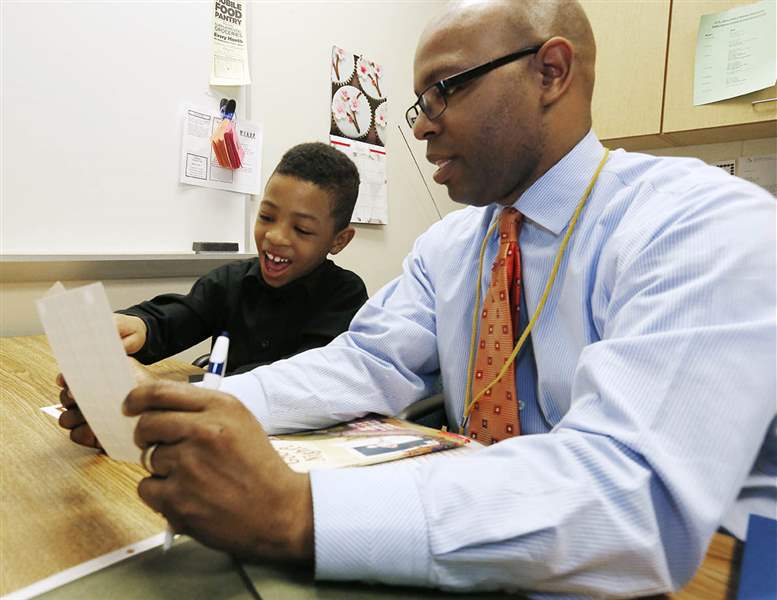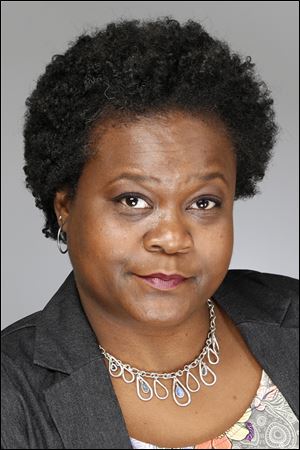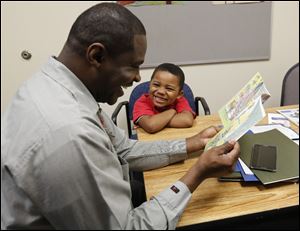
COMMENTARY
Toledo reading program pairs role models with at-risk boys
3/30/2014
Kobe Bailey, left, selects two stickers from Craig Teamer as a reward for his success reading ‘How do Dinosaurs say “Good Night?”’ during the Real Men READ-y program at Leverette Elementary School in Toledo.
THE BLADE/JETTA FRASER
Buy This Image

Hackney
They are some of Toledo’s most influential young and professional African-American men — among them a bank executive, a Bowling Green State University administrator, and a public library facilities employee — who quietly disappear from their demanding jobs for at least an hour a week.
The reason? To read to kindergarten boys who look just like them.
The pilot program, called Real Men READ-y, pairs black men with 12 at-risk black boys who attend Leverette Elementary. The men read to the boys three times a week using the dialogic method, which encourages active participation from the child. The kindergartners become storytellers who answer questions about what they are reading, seeing, and experiencing.
The project is race and gender specific for a reason — to help propel these boys beyond the many social, educational, and economic obstacles they may already face. Their teachers, who are often more aware of a student’s background and home-life situation, played a big role in the selection process, as did statistics that show how early little black boys are dropping out of school or joining gangs.
These are children who typically don’t have adults reading to them at home. They were chosen because they struggle with early literacy skills such as rhyming, alliteration, vocabulary, and letter sounds. And these are boys who are desperate for positive male role models. It’s that important combination of academic assessment coupled with social observations that could really help change life’s course for these boys.

David Bush, from the Toledo-Lucas County Public Library, helps Devin Burke read ‘The Boy Who Wouldn’t Share’ as part of the Real Men READ-y program, which gives black boys a role model.
The goal is to reach them at a young and impressionable age. It seems to be working.
One boy has started wearing a tie to school because his “MENtor” sports a tie. Attire aside, the boys will be assessed in June to determine whether their behavior, reading skills, and grades improved and whether they exhibited an increase in self-confidence.
“As an African-American male it is important that we provide the service and give back to younger generations, but it is just as important to be an example,” said Rodney Eason, 41, a volunteer and human resources executive for The Andersons Inc. “They really need to have someone who is excited about them, someone who wants to invest in them. It’s not just a nice thing that we are here to do. It’s something that has to be done.”
On a recent Thursday, I visited the school as four men huddled reading to their boys, Justin, Kody, Kobe, Ly'Jujuan, Ronald, and Devin. They were together for 20 minutes, time enough to read a book and discuss it. The boys were challenged to discover and pronounce animals such as giraffes and armadillos, write letters and words that appeared in the books, and identify colors.
The boys were so attentive and open to their mentors. There were high-fives exchanged when words were correctly sounded out and enthusiastic talk of types of dinosaurs. What was most striking was how trusting these little guys were; they opened up about everything, including their struggles at home. It was clear they just want someone to show interest in what they have to say.
“Why is reading important?” volunteer David Bush asked Devin after they finished reading The Boy Who Wouldn’t Share.
“Reading is important in kindergarten so once you get in first grade you know how to read,” Devin said.
“That’s an awesome answer!” said Mr. Bush, 49, a Toledo-Lucas County Public Library facilities and operations employee. “So what are you going to do to make sure you can read?”
“I’m going to go to the library close to my house and I’m going to check out some books,” Devin said, smiling big.

Kobe Bailey, left, selects two stickers from Craig Teamer as a reward for his success reading ‘How do Dinosaurs say “Good Night?”’ during the Real Men READ-y program at Leverette Elementary School in Toledo.
“You are making me so happy, Devin,” Mr. Bush said. “You don’t even know how happy that makes me.”
One can’t help but to get swept away by the passion of these men. They’re excited to be there, and nervous too. They want to do well and they feel the weight of responsibility to help these boys. The majority of them are fathers and raising their own children, but they have stepped up in a big way to better their community. The goal is for each child to have their own reader friend, but some of the mentors must take on more than one student. As it stands, the program has eight volunteers, with six additional men scheduled for training.
The program is a partnership between the African-American Initiative of United Way of Greater Toledo’s Joint Council, Read for Literacy, Toledo Public Schools, and the Toledo-Lucas County Public Library. The $9,000 budget pays for background checks for all the volunteers, three-hour training for them to learn the dialogic method, and for books for each of the 28 students in both kindergarten classrooms. Though not all the students have a reader friend, program coordinators felt it was important to encourage reading by helping all the students build an at-home library.
The mentorship reading was slated to begin in January, but the horrible weather and numerous snow days delayed things until February. By the time I visited, the boys were comfortable with the volunteers, who three times a week pull them out of class and escort them to rooms at the front of the school near the principal’s office. After reading, the boys go back to class with a participation certificate — with success stickers of their choosing — while the volunteers hang around to fill out progress sheets before starting another reading session.
Called a comparative study, all of the kindergarten boys were evaluated to measure their reading proficiency and their feelings about reading books. When the school year ends, the boys will be tested again to measure for improvements. Library employees select culturally sensitive books so the boys can relate to positive role models on the pages as well.
“What we really want to see in this specific assessment is that there is a very distinct attitudinal change toward books and reading,” said Nolan Hensel, director of volunteer services for Read for Literacy, the organization that manages Real Men READ-y. “The actual progress we’ll be able to see will be through teacher evaluation, through the tracking by volunteers, and when we do a final screen.”
All of this is the brainchild of Rhonda Sewell, chairman of AAI’s Strategic Partnership Committee. Ms. Sewell, who also is the library’s media relations coordinator, remembered her father volunteering for a similar program in Chicago and wanted to shepherd something here. She gets teary, and rightfully so, when she speaks of the impact.
“We don’t know what the outcome will be, but literacy, reading, and exposure to positive influences can obviously change lives,” Ms. Sewell said. “If there are true measured results, that’s going to be powerful.”
The methodology is fascinating, but I tend to agree with volunteer Alan Bannister, 41, who touts the social consequences of the program for these boys.
“With all of the variables in their lives, to have a professional African-American male who is there just for them, who shows up every week, assures them that there is a consistency in their lives,” said Mr. Bannister, a city of Toledo special projects manager.
These black men are doing their part to change the fabric of education and mentorship in Toledo, and for that they should be applauded. I implore more African-American men to step up and join them. Maybe next year this program can be extended to schools citywide.
To volunteer for Real Men READ-y or to volunteer for other literacy programs (ladies too), call 419-242-7323.
Suzette Hackney is an editorial writer and columnist for The Blade.
Contact her at: shackney@theblade.com, 419-724-6018, or follow her on Twitter @suzyscribe.